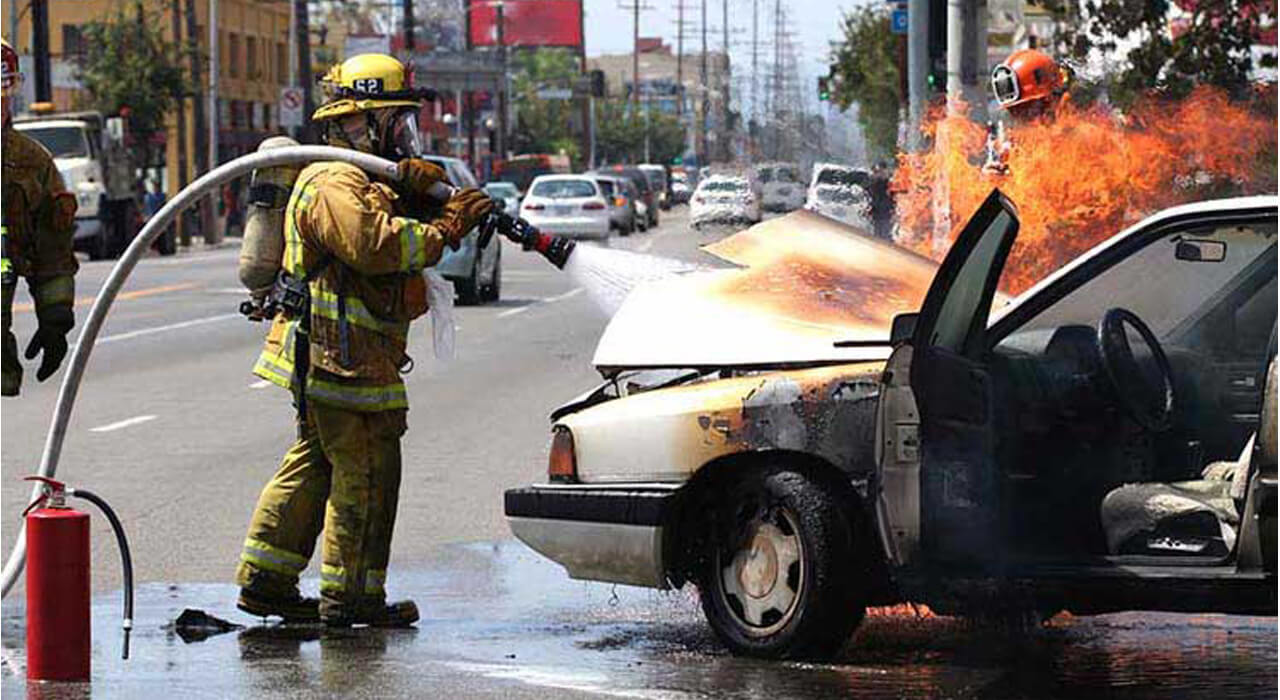Witnessing a car fire is an alarming experience. Thick black smoke, orange flames, and the urgent response of fire trucks and police create a scene that’s hard to forget. While the thought of your own vehicle catching fire may seem remote, understanding the common causes of car fires is crucial for the safety of you and your passengers.
Regular vehicle checkups and timely repairs can significantly reduce the risk of a fire. However, for those moments when knowledge is power, I’m here to share the top causes of car fires. Knowing these could not only save your car but also lives.
Common Causes of Car Fires
Seeing a car engulfed in flames can be a stark reminder of the dangers lurking within our daily commutes. Beyond the immediate danger and destruction, understanding the root causes of such fires is crucial for prevention. Several factors can contribute to vehicle combustion, but recognizing the most common triggers can steer us toward safer roads.
Electrical Malfunctions
One of the leading culprits behind car fires is electrical system failures. The intricate web of wiring that powers our vehicles can, unfortunately, turn into a fiery hazard under the right conditions. Electrical Malfunctions, from frayed wires to overloaded circuits, pose a serious risk. The car’s battery, although small, plays a significant role here. It’s capable of producing hydrogen gas – a potential explosion risk if not properly managed. Regular checks should include inspecting for any signs of wear and tear on electrical components. Using an OBD2 scanner can be a proactive step in this direction. It helps identify any engine faults early, allowing for preventative measures before problems escalate. This simple tool can be our ally in warding off electrical system malfunctions.
Fuel Leaks
Fuel Leaks rank highly among the causes of vehicle fires. These leaks often stem from the fuel system showing wear over time or sustaining damage during an accident. The volatile nature of gasoline means it doesn’t take much – a single spark at temperatures as low as 45 degrees Fahrenheit – for a leak to turn into a blaze.
Suggestion: 9 Best Affordable Safe Cars For Teenagers & New Drivers In 2024
Regular maintenance checks are vital to spot any signs of leakage promptly. Keeping a keen nose for the smell of gasoline in or around your car can also be a lifesaver. Attention to detail and quick action in repairing leaks can significantly mitigate this fire hazard.
Overheating Engines
Engines run hot; it’s part of their operation. However, when an engine overheats beyond its design specifications, it can lead to serious problems, including fire. The primary cause of Overheating Engines often lies in the cooling system failing to keep the temperature in check, whether from a coolant leak, blocked hoses, or a malfunctioning radiator fan.
These issues can lead to the engine running at dangerously high temperatures, increasing the risk of igniting oils and other combustibles within the engine compartment. My advice? Regularly monitor your vehicle’s temperature gauge and have your cooling system inspected at the first sign of trouble. Preventative maintenance isn’t just about avoiding breakdowns; it’s a critical practice for fire prevention too.
Human Errors
One of the often overlooked, yet significant causes of car fires is human error. Whether it’s due to neglect or deliberate actions, the impact can be devastating. By understanding how these mistakes can lead to dire circumstances, we can take steps to mitigate the risks and ensure our safety on the road.
Improper Maintenance
I cannot stress enough the importance of regular vehicle maintenance. It’s a crucial practice that goes beyond just keeping your car running smoothly; it’s about ensuring it doesn’t become a fire hazard. Over time, cars develop wear and tear, which if not addressed, can lead to critical failures. One of the most practical tools I’ve found indispensable in identifying potential issues is using an OBD2 scanner. This handy device can check for any engine faults that might not be immediately noticeable.
Also Check: Top 5 Reasons Why Your Car Won’t Start – Causes & Solutions
By checking regularly, we can prevent possible problems from escalating into something much worse. Beyond relying on technology, it’s also vital to visually inspect your vehicle for any signs of damage, leaks, or wear. The combination of high-tech diagnostics and good old-fashioned vigilance can significantly reduce the risk of fire due to mechanical issues.
Smoking in the Car
Smoking in the car is a human error that poses serious risks, not just to the smoker’s health but also to the vehicle’s safety. The act of smoking can lead to accidental fires if a lit cigarette comes in contact with flammable materials inside the car, such as upholstery or spilled fluids. Despite the appearingsimplicity of the action, the consequences can be severe, highlighting the need for safer practices. If smoking cannot be avoided, I’d recommend at the very least using an ashtray and ensuring all cigarette butts are fully extinguished before disposing of them. Better yet, adopting a no-smoking policy in your vehicle is the safest route to prevent fires and protect the health of all passengers.
Incorporating regular checks with an OBD2 scanner, being vigilant about vehicle maintenance, and adopting safer personal habits like refraining from smoking in the car are all steps we can take to minimize the risk of fires caused by human error. By acknowledging these potential hazards and acting proactively, we safeguard not only our vehicles but also our lives and those of other road users.
External Factors
When we explore the causes of car fires, External Factors play a significant yet often overlooked role. These external elements can escalate quickly, turning a small issue into a devastating fire. Here, I’ll dive into arson and wildfires, two external factors that have been responsible for numerous vehicle fires worldwide.
Also Check: Difference Between 2024 Mazda CX 30 vs CX 5 – Which Is Better?
Arson
Arson, the deliberate setting of fires, emerges as a leading external factor inducing car fires. Disturbingly, motivations behind arson vary widely, from vandalism and insurance fraud to covering up evidence of another crime or even acts of revenge. This malicious intent makes arson particularly unpredictable and dangerous. It’s alarming how simple tampering with a car’s fuel system or an electrical short can lead to a catastrophic blaze. Arson isn’t just about the fire; it’s a reminder of the deliberate vulnerabilities our vehicles face daily.
Wildfires
On the natural disaster front, Wildfires stand as a formidable force capable of igniting car fires. Vehicles caught in the path of a raging wildfire can quickly become engulfed, leaving them irreparable or completely destroyed. These fires spread rapidly, fueled by dry conditions and often catching drivers off-guard. Wildfire-induced car fires underscore the importance of staying informed about fire hazards in your area, especially during peak wildfire seasons.
Preventative Measures
In both these scenarios, knowledge and preparation are your best defenses. For arson, always park in well-lit areas and consider security cameras if your vehicle is parked at home. In the case of wildfires, staying updated with local news and avoiding areas under threat can save your car and, more importantly, your life.
Moreover, investing time in regular vehicle maintenance, including using an OBD2 scanner to check for any engine faults, is paramount. This simple practice allows for early detection of potential problems that could escalate into fire hazards if left unaddressed. Regular checks are not just about maintaining your car’s health; they’re crucial for ensuring safety on and off the road.
Understanding these external factors is essential in taking proactive steps to protect ourselves, our loved ones, and our possessions from unexpected fire hazards.
Conclusion
Understanding the top causes of car fires, especially those stemming from external factors like arson and wildfires, is essential for every driver. I’ve shared the importance of staying vigilant, taking proactive steps such as parking in secure areas, and keeping up with vehicle maintenance to minimize risks. Remember, awareness and preparedness can make all the difference in protecting yourself and your vehicle from unforeseen dangers. Let’s not overlook the power of an OBD2 scanner in spotting potential issues before they escalate. Stay safe and informed, because on the road, knowledge is as crucial as your car’s engine.




